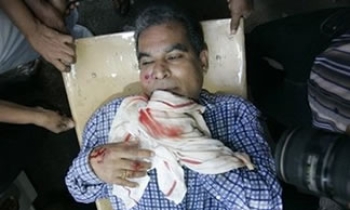The Saudi government issued a decree on April 29 imposing new restrictions on the media and drastically limiting press freedom. The decree, which amends five articles of the 2000 press and publications law, is clearly designed to ensure that the protests sweeping the Arab world since the start of the year do not take any greater hold in Saudi Arabia than they have already.
The decree bans publication of any material that “contradicts Islamic Sharia law,” “serves foreign interests” or “undermines national security.” It also requires journalists to restrict themselves to criticism that is “objective and constructive” and “in the public interest.”
Anyone contravening the new regulations can be fined of up to 500,000 riyals (around 90,000 euros) and banned from writing for the media for life. The decree’s vague wording leaves a lot of room for arbitrary enforcement. Paris-based press freedom group Reporters sans Frontières (RSF) called for it to be rescinded at once.
Nazir Al-Majid, a writer who was arrested on April 17 for participating in demonstrations in the eastern city of Khobar, has meanwhile been suspended from his post as teacher in a local state school. Security agents searched his home and confiscated his computer when they arrested him. He posted an article titled “I protest, therefore I am a human being” last month on the Rashid.com, news website.
Two Shiite bloggers who were very active online – Mustafa Badr Al-Mubarak, 26, and Hossein Kathem Al-Hashem, a 25-year-old student – were arrested in the past few days in the eastern governorate of Al-Qatif and are being held in a police station in the town of Safwa. Their computers were confiscated.
According to information obtained by the NGO Front Line (http://abna.ir/data.asp?lang=3&id=239450), Sheikh Mekhlef bin Dahham Al-Shammari, a writer and social reformer who has been held without trial since June 15, 2010, could be tried before a state security court, possibly on the terrorism charge that was brought against him when he was arrested in 2007. Al-Shammari has been arrested several times in recent years because of his close contacts with representatives of Saudi Arabia’s Shiite minority.
Ever since the start of the unrest in the Arab world and, in particular, the protests in neighbouring Bahrain, Riyadh has been taking all sorts of measures to forestall their spread to Saudi Arabia. The authorities have blocked access to websites calling for reform in Saudi Arabia that emerged after the demonstrations in Tunisia and Egypt (http://dawlaty.info/ and http://www.saudireform.com/). They have blocked the “Revolutionary Nostalgia” Facebook page that is calling for reforms. A BBC crew was prevented from covering the unrest in the eastern city of Hufuf in March. And a Reuters correspondent’s accreditation was withdrawn on 15 March for alleged inaccuracies in a report on a demonstration.
Saudi Arabia is ranked 157th out of 178 countries in the 2010 RSF press freedom index.









